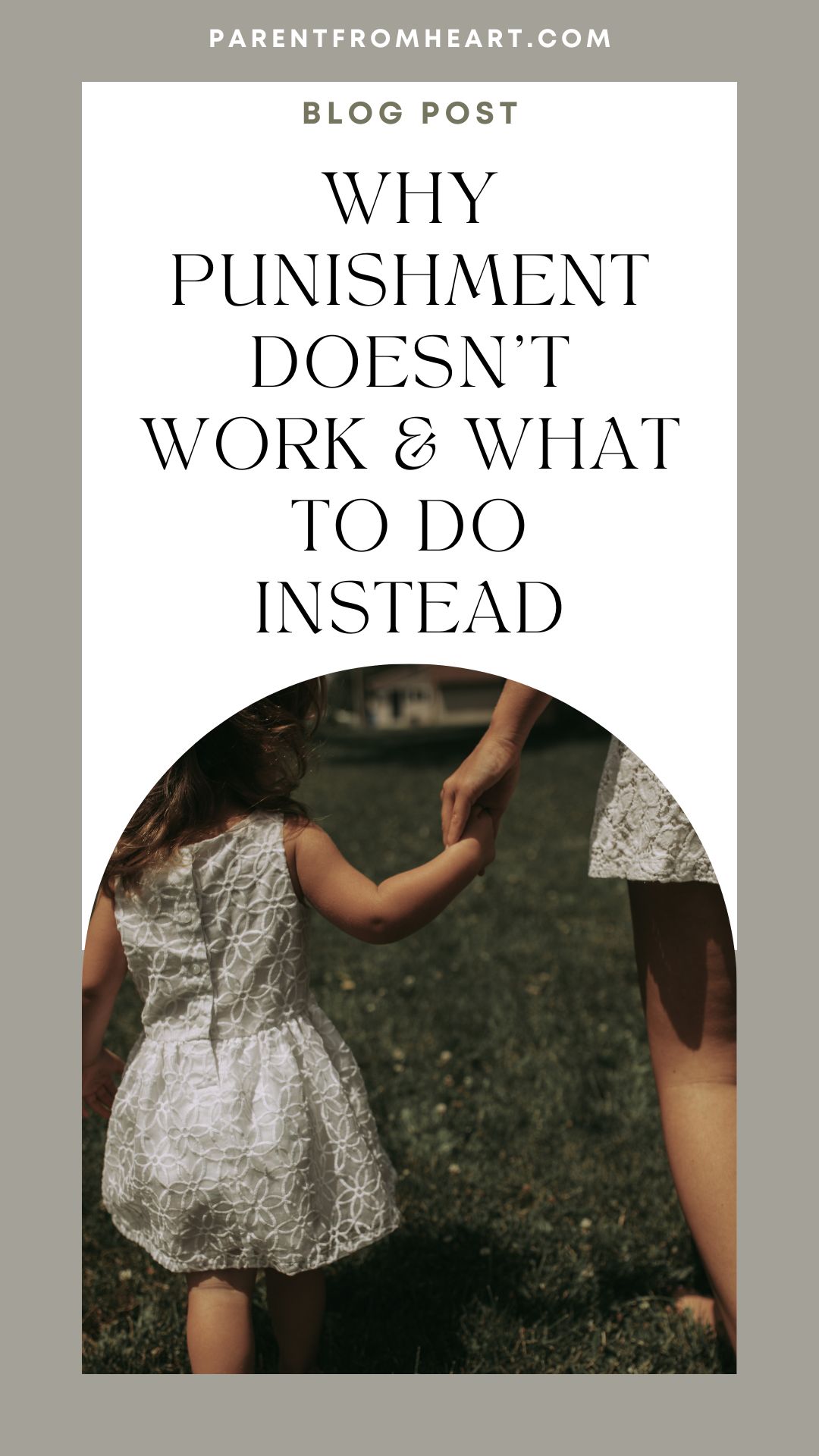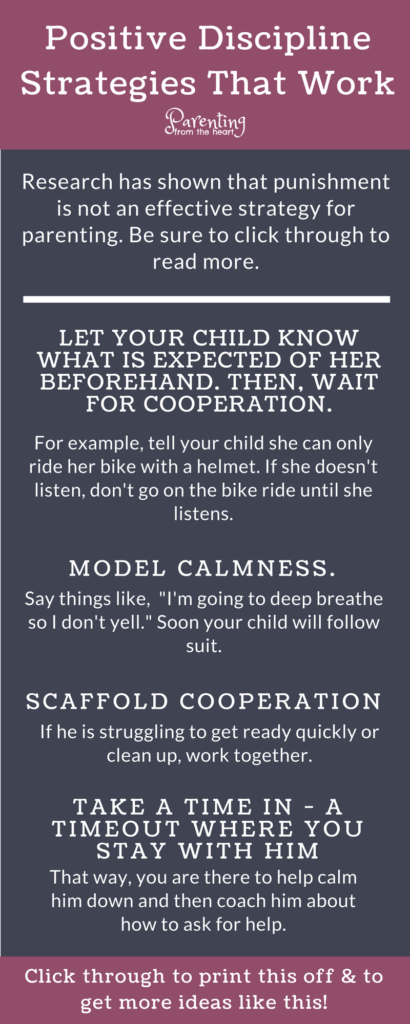As parents, it becomes easy to default to punishment. For many of us, it’s how we were raised. And when we see temporary compliance, we assume it works. Here’s what research says about how punishment doesn’t work in the long term, as well as more effective alternatives rooted in positive discipline.
As a young boy in Catholic school, my dad remembers being pulled out of class. (He may have deserved that part of it).
The priest asked him to stand one inch from a brick wall. After being chastised, the priest slammed my dad backwards finalizing his penance.
Thankfully, corporal punishment is no longer used in schools and has vastly departed from households. While this is a huge step in the right direction, many of us were nevertheless raised using less physical forms of punishment.
Because it’s part of our personal history, it can feel almost instinctive to use harsh or arbitrary punishments.
No one wants to raise children who don’t listen. We want to see good behavior in our children, and we want to see them using self-control and problem-solving appropriately through challenging situations. When our children defy us, we want to stop their bad behaviour as fast as possible.
On top of it, when children don’t listen, they can trigger our anger. If we yell or inflict a penalty, such as grounding them or even spanking them, children react with disappointment or frustration. We perceive their feelings as remorse. And as a result, we deduce that we’ve done a good job because the child now understands he was bad. Punishing starts making sense.
The effect on our children is much different than our perceptions, though.

Why punishment doesn’t work, according to research
When we punish children, we typically see the behaviour stop.
And so, we figure it’s worked.
We achieved our desired outcome temporarily so all seems well. But, our success is only short-term, and the damage inflicted can last much longer.
Extensive behavioural studies have shown that punishment can result in an increase in obedience but undermines the development of moral reasoning. What most of us want are children who do the right thing whether we are with them or not. Punishment only results in a fear of being punished. This “…is not an effective deterrent unless there is a real chance of being caught.” Additionally, when a child feels ignored, punishment can act as a reward for poor behaviour.
Related reading: How to Discipline a Child: Why science says this is the best approach

Strict Parenting versus Empathetic Parenting
The main goal of parenting is to increase self-regulation and moral development in our children. In the first place, we want to raise our children to act well in any situation regardless of the fear of consequences. Countless studies have examined the impact of different parenting styles on child development. They have found that children raised in strict, or authoritarian households are more likely to lack self-discipline when compared to children with empathetic or authoritative parents. The reason is that punitive discipline fails to adequately teach the child. The child learns there is a part of him that is undesirable or bad. That’s it.
Corporal punishment merely serves as extrinsic motivation, as the child tries to avoid “getting into trouble” merely to avoid punishment. Rather, we want to foster intrinsic motivation in our children, where they learn to see the value of doing the right thing without fear of punishment.
Furthermore, children learn that power wins over reasoning. Because authoritarian parenting centres on obedience instead of discussion, children become less likely to understand emotion, and they fail to develop their own moral reasoning. They also become more prone to anxiety, rebellion, and depression. Not only that, but authoritarian parenting hinders a child’s social development and weakens the parent-child relationship.
Strict Punishment is Ineffective, What Should We Do Instead?
There are effective ways to discipline without using authoritarian forms of punishment. Here are some wonderful ways to teach your child when they’ve made a poor choice.
Good behaviour starts with clear expectations.
Consider this modern-day example. Recently, my husband and I stayed at a hotel for our anniversary. We had been in and out of the lobby several times when a manager raced after us. “You need to wear masks,” he declared. Because we were the only ones in the lobby (aside from the staff who were behind plexiglass desks) and there was no signage indicating we should wear masks inside hotel public areas, we weren’t wearing them. The fleet of staff and some patrons in the restaurant were now watching us. Once masked, my husband said to the manager, “It would have been nice if we were told this when we checked in.”
Not knowing expectations is frustrating and potentially embarrassing too.
To promote better behaviour in children, family rules should be clear. Children need proper guidance, clear expectations, and positive reinforcement as they learn to navigate the world around them. Whenever possible, let children know how to behave outside of the heat of the moment. This could be telling a toddler she needs to use a quiet voice before entering a library or telling a tween he needs to finish his home reading before heading out to play street hockey.

Simple, firm language can work wonders.
When children don’t listen, it is frustrating and it can be easy to default to old, less effective parenting practices. But, we have to remember that children lack development in their prefrontal cortex which is what helps with logic, reasoning, and emotional regulation. This can make it challenging for them to not only navigate strong emotions but also to attend to what we’re saying to them.
The solution to poor listening is often simple. In their best-selling book, How to Talk so Kids Will Listen and How to Listen so Kids Will Talk, Faber and Mazlich recommend reiterating directions using minimal language. I recommend asking children for eye contact or another sign they’re listening, like putting their hands on their heads. This is great because it’s already a sign of cooperation. Then, try phrases like:
- “Shoes away!”
- “Homework before Nintendo.”
- “Your room needs to be clean before the park.”
There’s no need for coercion. Instead, stand firm and wait for cooperation.
What is Positive Discipline and Why You Might Have it Wrong
When children don’t listen, consequences should be related, respectful and reasonable.
Thanks to free will there will be times when children do not listen. This doesn’t mean that we need to become permissive parents who simply allow our disobedient children to run wild. Parenting experts agree that logical consequences are a highly effective form of discipline and more effective than mild punishments or negative consequences. Logical consequences are “…constraints that specifically focus on addressing the problem created by children’s transgression rather than on merely eliciting aversion” H.G. Ginott.
In contrast, mild punishments are not directly related to the child’s transgression. For instance, a mild punishment would be grounding a child who broke the TV while a logical one would be that child helping to pay to fix the TV.
Logical consequences are ones related, respectful and reasonable. Studies show that children are more likely to learn from their behaviour and internalize their parents’ values when these types of consequences are used. In conjunction with logical consequences, using positive reinforcement as a way to acknowledge when your child is doing something right is a great way to enforce expectations while building their confidence.
No matter what form of discipline you choose or even if you end up defaulting to punishment, the key to effective parenting is connecting with your child. When disciplining, connection is paramount. They must feel understood in order to understand. Without this piece, the opportunity to learn from their mistakes is lost.
More great articles that you may find helpful too














These are great tips. Connecting with our children is so very important and after reading this I understand now how important it is to stay connected when we want them to learn from their mistakes.
I totally agree with this. In fact, I feel like when I try to punish my daughter, it backfires and she acts out even more. However, when I remain calm and get down to her level, as you say, she seems to really listen to me and respond. It’s not always easy to parent like this, because I was definitely punished as a kid, so sadly it’s what I know. So I feel basically feel like I’m changing my instincts. Great post! You’re a great mom 🙂
Really good strategies and suggestions, I find teaching with love helps so much more than a time out. But can I ask a question, isn’t taking away something they love a form of punishment? Or is that my old world perception!?
That’s a great question. It really is a form of punishment. The differentiation would be that they can earn their lost privilege back so there is a process and an outcome whereas other forms of punishment are simply punitive.
In adulthood most punishments are punitive. It is wise to accustom children to this reality early. It is far better that they learn this lesson from their loving parents with a paddle and an explanation than with a police officer with tazer and a pistol.
These are great tips. Sometimes it is difficult not to lash out, especially when you are trying to help your other little ones. But, it is so important to slow down and try to understand why your child is acting out.
I feel this way too. I can only imagine with four little ones. I try my best but I lose my cool too.
Great suggestions!!! I need to send this to my hubby lol. He was raised completely opposite as me where he got strict punishments for just about everything in life and sometimes he tries to punish my daughter for the littlest of things. Drives me insane since I really don’t think that’s the route to go with kids, especially little ones who don’t know they are doing something wrong half the time. I feel
Talking to kids and explaining why those actions were wrong works so much better than just yelling and punishing without a full explanation…
I couldn’t agree more and can totally relate with my husband.
I’m with CourtneyLynne here! My husband and I were raised differently so it has been a challenge to guide him toward the world of empathetic parenting. He still looks at it as coddling but I find my 4 yr old to be developing amazing contentiousness lately and understand that it’s a process – no one is perfect!
Very-well said. I too believe that punishment won’t make children disciplined.
Thank you so much for reading and for your comment. As you can tell, I agree <3
The days when children are slammed against the walls, are not far behind. I’m lakshya, 18 years old, I live in India. Just passed out my school. For 16 years straight, I’ve seen my mates getting hit, yeah I mean baby hit in school by teachers, they bully them, humiliate them in front of the whole class, abuse them so badly. In India, doesn’t matter how much they say that they have banned these punishments, in schools it is still happing and lives of millions of students, are, getting ruined. But I’ll change everything, everything.